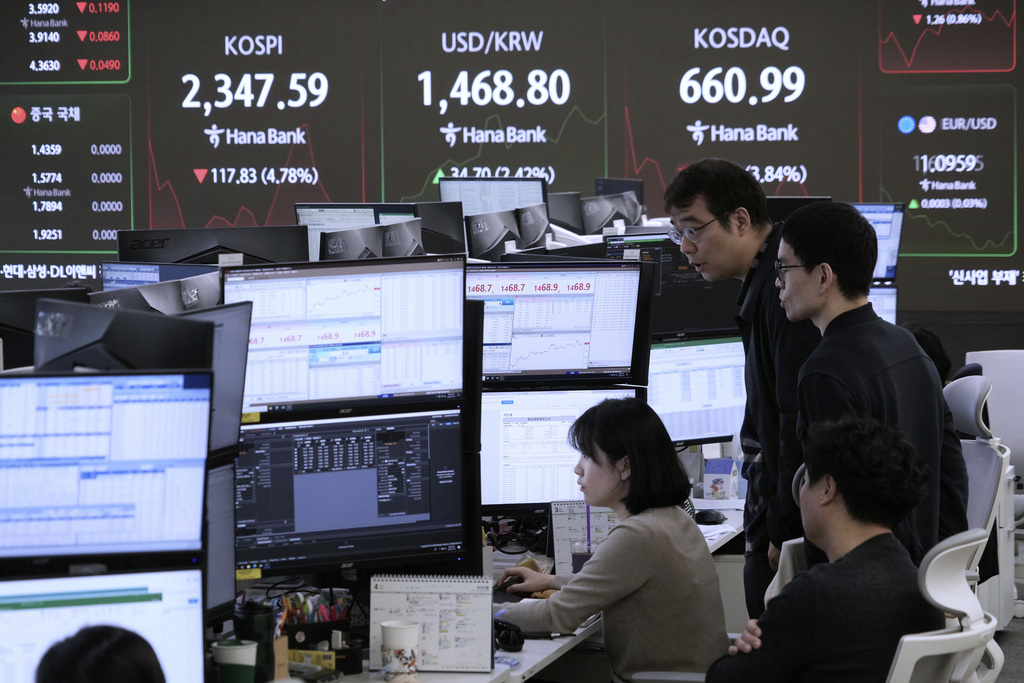TOKYO (AFP) – Panic selling gripped global markets on Monday, as US President Donald Trump refused to budge on his swingeing tariffs despite China retaliating and global recession warnings growing louder.
Countries across the world have been scrambling to blunt the edge of the new US tariffs, but Beijing signalled it was taking the levies head on, escalating the trade war between the world’s two biggest economies.
Trump doubled down on his demand to slash deficits with the US’ trading partners, saying he would not cut any deals unless that was resolved.
“Sometimes you have to take medicine to fix something,” Trump said on Sunday.
He told reporters aboard Air Force One that world leaders are “dying to make a deal.”
Trump announced last week a baseline 10-per cent import tariff on goods coming into the United States and higher rates for many countries including allies the European Union, Japan and Taiwan.
Most countries have stopped short of retaliating but China announced on Friday — after Asian markets closed — retaliatory tariffs of 34 per cent on all US goods from April 10.
“(This) is blunt-force economic warfare,” said Stephen Innes at SPI Asset Management.
“The market’s telling you in plain language: global demand is vanishing, and a global recession is on the cards and coming on fast,” Innes said.
Trillions of dollars have been wiped off stocks worldwide, and on Monday Asian equities took an even heavier hammering as investors moved to safer assets.

In Japan the Nikkei was off an eye-watering 6.5 per cent, falling almost eight per cent in early trade.
In Hong Kong the Hang Seng plunged almost 10 per cent and the Shanghai Composite more than four per cent.
Taiwan’s main index — like in Hong Kong and Shanghai closed on Friday — plummeted almost 10 per cent and Singapore 8.5 per cent.
Futures contracts for the New York Stock Exchange’s main boards were sharply down Sunday, suggesting more pain for battered Wall Street stocks when markets open Monday.
US oil dropped below USD60 a barrel for the first time since April 2021 on worries of a global recession.
Benjamin Netanyahu, prime minister of Israel — which has been hit with 17 per cent tariffs, despite being one of Washington’s closest allies — was due Monday to become the first leader to meet Trump since last week’s announcement.
Britain’s Prime Minister Keir Starmer warned in a newspaper op-ed that “the world as we knew it has gone,” saying the status quo would increasingly hinge on “deals and alliances.”
Trump’s staggered deadlines have left space for some countries to negotiate, even as he insisted he would stand firm and his administration warned against any retaliation.
“More than 50 countries have reached out to the president to begin a negotiation,” Kevin Hassett, head of the White House National Economic Council, told ABC’s This Week on Sunday, citing the US Trade Representative.
Vietnam, a manufacturing powerhouse that counted the US as its biggest export market in the first quarter, has already reached out and requested a delay of at least 45 days to thumping 46 per cent tariffs imposed by Trump.
Treasury Secretary Scott Bessent also told NBC’s Meet the Press that 50 countries had reached out.
But as for whether Trump will negotiate with them, “I think that’s a decision for President Trump,” Bessent said.
“At this moment he’s created maximum leverage for himself… I think we’re going to have to see what the countries offer, and whether it’s believable,” Bessent said.
Other countries have been “bad actors for a long time, and it’s not the kind of thing you can negotiate away in days or weeks,” he claimed.
Peter Navarro, Trump’s tariff guru, has pushed back against the mounting nervousness and insisted to investors that “you can’t lose money unless you sell,” promising “the biggest boom in the stock market we’ve ever seen.”
Russia has not been targeted by the latest raft of tariffs, and Hassett cited talks with Moscow over its invasion of Ukraine as the reason for their omission from the hit list.
On Wednesday a White House official suggested the reason for Russia’s omission was because trade was negligible thanks to sanctions.
Trump has long insisted that countries around the world that sell products to the United States are in fact ripping Americans off, and he sees tariffs as a means to right that wrong.
“Some day people will realize that Tariffs, for the United States of America, are a very beautiful thing!” Trump wrote on Truth social Sunday.
But many economists have warned that tariffs are passed on to US consumers and that they could see price rises at home.
“I don’t think that you’re going to see a big effect on the consumer in the US,” Hassett said.


